 Mr. President, how can it be that the opposition with more votes than your party got only 37% of the Deputies? Sorry, well… I… then… you…well, did you see the bird? Did you see it? Ah? Did you see it?
Mr. President, how can it be that the opposition with more votes than your party got only 37% of the Deputies? Sorry, well… I… then… you…well, did you see the bird? Did you see it? Ah? Did you see it?
—Art. 186 of Venezuela’s Constitution (Chavez’ Constitution) says”The National Assembly will be composed by Deputies elected in each federal entity by universal, direct, personal and secret vote with proportional representation, according to a population base of 1.1 % of the population.
—Despite this, the opposition, despite obtaining approximately the same number of votes as Chavez’ PSUV party, only got 39.39% of the Deputies in the National Assembly. Not Proportional at all, as stated in the Constitution.
—This happened because of a rule change, a new “methodology”, which was selectively applied only to eight States: Zulia, Distrito Capital, Miranda, Carabobo, Amazonas, Barinas, Lara and Táchira. These are the States where the opposition has strength, except fr Chavez’ home state of Barinas.
—The top five vote candidates by vote, were all opposition candidates, the bottom 15 candidadtes by vote were Chavista candidates.
—Pro-Chavez candidates that won received on average 55,092 votes, Opposition candidates on the other hand received on average 81,728 votes.
—Without the revolutionary new “methodology” the opposition estimates it would have obtained 14 more Deputies (79), at the expense of Chavez’ PSUV which would have obtained 81 seats in the Assembly.
—In the Capital District, the opposition got more votes than Chavez’ PSUV, but only won two out of eight nominal Deputies. So much for proportionality…
—In Carabobo State, the opposition got 53.7% of the votes and PSUV got 43% of the votes, despite which the opposition only got four Deputies and Chavismo seven. Proportionality is truly dead in Carabobo.
—And it works both ways, because of the rule tampering and the methodology, in Zulia State, the opposition got 54.8% of the vote versus Chavismo’s 44.4%, but the opposition got twelve out of thirteen Deputies. That’s not fair either, but it results from the new “methodology”. The opposition getting so many votes was not in the “plan”, the “methodology” was implemented when Chavismo was more optimistic.
—Finally, no matter how you want to spin it, the truth is that Chavismo did not do well. As proof, here are the voting trends in three Chavista strongholds of the past, including Vargas State, once considered as strong Chavista territory as could exist. The chart shows the percentage of the vote for Chavez for President in 2006, for the Chavista Governor and for the list vote in this election. The trend is clearly not Chavismo’s friend in any of these states. Just extrapolate two more years.

